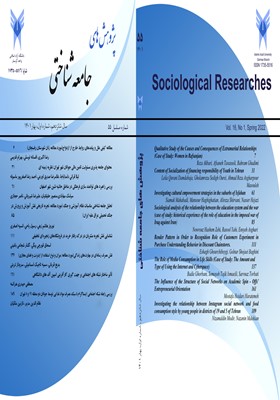Sociological analysis of the relationship between the education system and the war (case of study: historical experience of the role of education in the imposed war of Iraq against Iran)
Subject Areas :Nowruz Hashem Zehi 1 * , Rasool Yahi 2 , Ensyeh Asghari 3
1 - Assistant Professor, Department of Social Sciences, East Tehran Branch, Islamic Azad University, Tehran, Iran
2 - Master of Defense Studies, Social Department Researcher, Kondakav Social Research Center, Tehran, Iran
3 - Master of Sociology, Researcher of Cultural-Political Department, Kondakav Social Research Center, Tehran, Iran
Keywords: مدیریت بحران, نظام آموزشی, crisis management, Iran-Iraq War, جنگ ایران و عراق, education system, Document Analysis, آموزش و پرورش ایران, تحلیل اسناد, Iran Education,
Abstract :
Every organization is created to respond to goals and specially to redefine needs in times of war. Social subsystems must be both managed and assisted in crisis management in order to survive the crisis. The purpose of this article is to analyze the role of the Ministry of Education in helping to balance the education system during the Iraq-Iran war on the one hand and creativity in supporting the war in the historical period from 1980 to 1988 on the other hand. The research method is qualitative and of historical research type. The data collection tool is receipt and interview, which has been done by using all the documents of first- and second-hand textual sources and interviews of education directors during the imposed war. The method of analysis is thematic analysis. According to the research findings, the Ministry of Education in the field of playing a specialized role in formulating special educational rules and regulations during the war, the establishment and operation of training complexes for combatants behind the front and war zones, creating conditions for continuing education and compensatory classes and strengthening militant students, education through television has taken place during the bombing of cities. The most important public actions of this ministry were setting up a war relief and support headquarters, sending teachers and students to the front, participating in building fortifications and shelters in schools, and continuously rebuilding bombed schools. The ministry helped strengthen community support for combatants by managing moral challenges and establishing behind-the-scenes training. The relationship between education and the war greatly influenced the positive cultural values of the society and the spread of the ideology of the leaders in the first decade after the Islamic Revolution.
_||_

